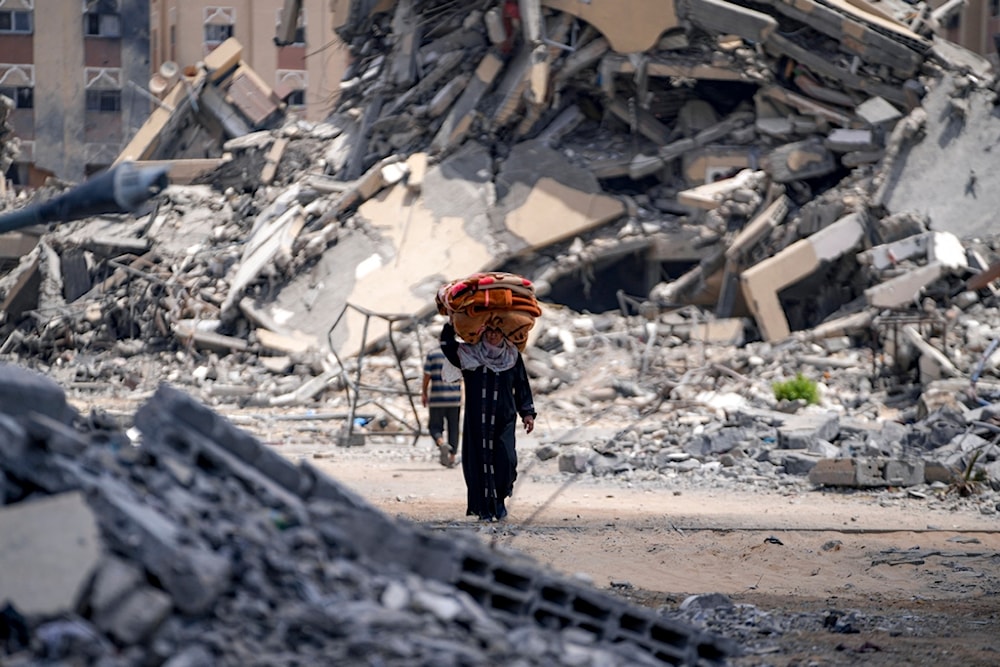US, European states tell Iran to stand down, fail to mention 'Israel'
The parties emphasized support for "Israel's defense against Iranian aggression" as well as attacks by the Axis of Resistance.
-

A Palestinian displaced woman by the Israeli air and ground offensive on the Gaza Strip flees from Hamad City, Khan Younis, Sunday, August 11, 2024. (AP)
The leaders of the United States, United Kingdom, France, Germany, and Italy have discussed the situation in the Middle East, as per a White House official statement.
According to the leaders, efforts to de-escalate tensions and secure a ceasefire and captive agreement were emphasized.
The leaders expressed support for Biden, Egyptian President el-Sisi, and Qatar's Amir Tamim's combined request to restart discussions later this week to finish the deal as quickly as possible, emphasizing that there is no more time to waste.
According to the statement, all parties must fulfill their duties, and "delivery and distribution of aid is needed."
All parties emphasized support for "Israel's defense against Iranian aggression" as well as strikes by the Axis of Resistance, despite the Israelis starting the escalation.
"We called on Iran to stand down its ongoing threats of a military attack against Israel and discussed the serious consequences for regional security should such an attack take place."
Earlier today, the leaders of France, Germany, and the United Kingdom issued a joint statement in which they expressed their support for ongoing diplomatic efforts led by Qatar, Egypt, and the United States to secure a ceasefire and release the captives in Gaza, in light of the ongoing genocide.
The three states expressed that they backed the call by the respective leaders of the aforementioned countries for the immediate resumption of talks to get a ceasefire agreement underway in Gaza.
They underlined that there should be no further delay in achieving these goals. "We have been working with all parties to prevent escalation and will spare no effort to reduce tensions and find a path to stability," the statement read.
They also highlighted the urgent need for unrestricted delivery and distribution of humanitarian aid to the people of Gaza and the release of all captives in the blockaded war-torn Strip.
Moreover, they went on to call on Iran and its allies, likely the Ansar Allah movement in Yemen and the Hezbollah Resistance movement in Lebanon, to refrain from taking any actions that would "further escalate regional tensions and jeopardize the opportunity to agree on a ceasefire and the release of hostages."
The statement held them responsible "for actions that jeopardize this opportunity for peace and stability" while completely disregarding the actions of the Israeli occupation that forced the hand of Iran and its allies to respond to it, to begin with.
No condemnation for 'Israel'
The Israeli occupation had launched airstrikes on Tehran, Beirut, and Hodeidah, violating the sovereignty of each of said countries – and in the case of the first two, it was to assassinate senior officials, further stoking tensions and essentially forcing the respective parties to retaliate.
However, while Iran and its allies' rights to retaliation were preemptively condemned, the Israeli occupation's highly inflammatory actions were not even addressed.
Iranian officials have made it clear that Tehran's response to the Israeli assassination of Hamas Political Bureau chief Ismail Haniyeh, which was carried out on Iranian soil, is inevitable.
Moreover, "Israel" assassinated top Hezbollah commander Sayyed Fouad Shokor (Hajj Mohsen) in an airstrike in Haret Hreik, the Southern Suburb of Beirut, hours before Haniyeh's assassination.
The Lebanese group's Secretary-General Sayyed Hassan Nasrallah vowed that Hezbollah's response to Hajj Mohsen's assassination "is coming, and it will be strong, impactful, and effective."
"Israel" believes that Hezbollah will initiate the attack, possibly targeting Tel Aviv with guided missiles, according to Yoel Guzansky, a senior researcher at the Institute for National Security Studies in Tel Aviv.
Israeli media reported on Monday that Israeli occupation Prime Minister Benjamin Netanyahu met with his security chiefs to discuss the possibility of a preemptive strike against Iran if an attack appears imminent.
"That’s something that we haven’t gotten to yet, but the future is yet to come," confirmed the senior Israeli politician.

 4 Min Read
4 Min Read








